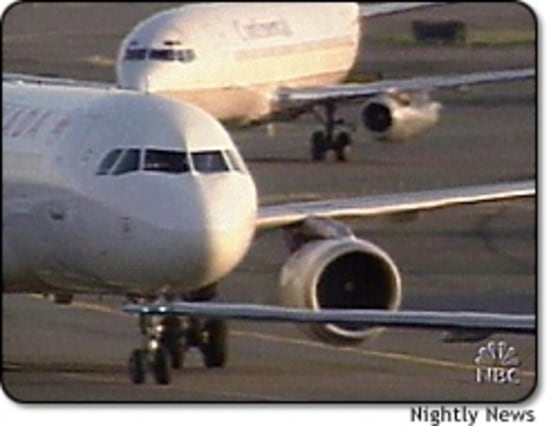On the heels of a Homeland Security warning that al-Qaida operatives could commandeer cargo planes from abroad and fly them into U.S. nuclear power plants, bridges and dams, cargo pilots and U.S. officials say America’s cargo industry is dangerously vulnerable to terrorist plots.
On Friday, the Department of Homeland Security warned state and local authorities that al-Qaida might be plotting to fly cargo planes from overseas into U.S. targets.
There was no specific threat or timetable for attack, officials said, but the intelligence community was taking the warning seriously.
The latest security alert also worries America’s 12,000 cargo pilots, who have been warning of inherent security problems in the cargo industry since the 9/11 attacks, said Leon Laylagian, an official of the Coalition of Airline Pilots Association, which represents 21,000 air-crew members, including cargo pilots.
More than 2,000 cargo flights land in the United States every day. While passengers and their luggage are searched on commercial airliners, only about one percent of air cargo is subjected to a random physical search, Laylagian said.
”[The government] is still not getting the wakeup call out there,” he said.
Security breaches
Laylagian, other cargo pilots and U.S. officials point to recent security breaches in the cargo system.
In September, for example, Charles McKinley, a 25-year-old stowaway, managed to ship himself as air cargo in a wooden crate. Part of his journey included flights between New Jersey and Texas, where he was discovered and arrested only upon being delivered to his parents’ home. McKinley pleaded guilty in court on Friday and faces up to a year in prison and a $100,000 fine for his actions.
Not long before the human cargo incident, several fishermen were able to walk freely for hours in a secure area of New York’s JFK airport.
Cargo planes are traditionally banished to remote tarmacs, which, although removed from busy passenger terminal areas, are less secure than other parts of airports. In addition to perimeter security issues, many cargo planes have no cockpit doors, and identification checks for cargo staff at many airports are not as stringent as in passenger areas, pilots say.
To compensate for what they see as lax security, cargo pilots have lobbied for government licences to carry guns. While passenger pilots can now carry weapons, cargo pilots were left out of the Homeland Security Bill — a situation they hope to change through new legislation.
‘Flying bombs’
“We must ensure that neither passenger planes nor cargo planes are used again as flying bombs to once again terrorize our country,” said Rep. Ed Markey (D-Mass), a senior member of the House Select Committee on Homeland Security, who recently took reporters on a tour of a large cargo screening machine being tested at Boston’s Logan Airport.
Logan Airport — where al-Qaida operatives commandeered two planes used in the 9/11 terrorist attacks — has become a leader in revamping cargo security, pilots’ association official Laylagian said.
At present, the U.S. Transportation Security Administration leaves it up to shipping companies to monitor their freight through the Known Shipper Program. But pilots counter that unknown shippers — like human cargo flier McKinley — can infiltrate the system, and there’s still no mechanism for detecting what’s inside packages.
“Al-Qaida continues to place commercial airlines at the very top of their terrorist target list, yet the Department of Homeland Security will not act to close the gaping loophole that still exists in our commercial airline security,” Congressman Markey said.
Experts and pilots also caution that the air cargo industry’s woes also extend to passenger planes, which carry unscreened cargo next to passenger luggage in the luggage hold.
NBC’s Preston Mendenhall is on assignment in New York.
